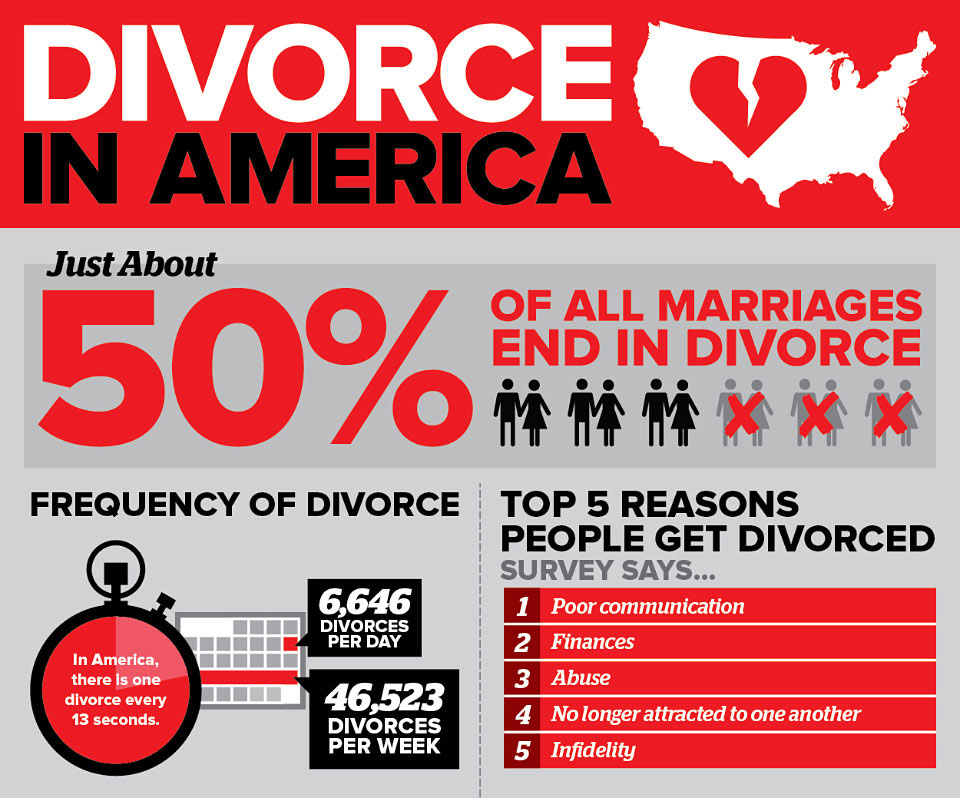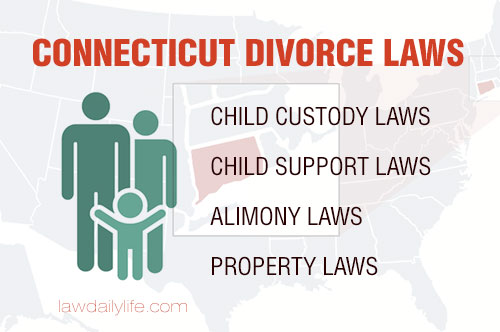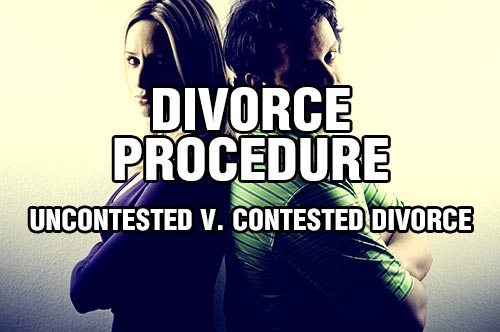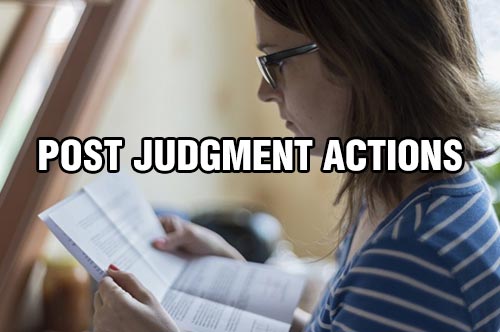The following is a summary of Connecticut divorce laws, and is by no means intended to be an all-inclusive description of what to expect in your particular case. In some cases, the exact text of the statute may have been simplified and/or modified to provide for easier understanding. For a more specific understanding of the laws, you should consult the full Connecticut Code and/or consult with an attorney about how the law might apply to your particular situation.

Connecticut Divorce Grounds
A divorce can be granted under Connecticut laws for any of the following grounds:
- The marriage has broken down irretrievably;
- Living apart by reason of incompatibility for a continuous period of at least 18 months immediately prior to the service of the complaint, with no reasonable prospect of reconciliation;
- Adultery;
- Fraudulent contract;
- Willful desertion for one year with total neglect of duty;
- Seven years’ absence, during all of which period the absent party has not been heard from;
- Habitual intemperance;
- Intolerable cruelty;
- Sentence to imprisonment for life or the commission of any infamous crime involving a violation of conjugal duty and punishable by imprisonment for a period in excess of one year;
- Legal confinement because of mental illness, for at least an accumulated period totaling five years within the period of six years next preceding the date of the complaint.
-From Sec. 46b-40 of the Connecticut Statutes.
Residency Requirements
A complaint for divorce can be filed any time after either party has established residence in Connecticut, intending to live as a Connecticut resident.
However, before the court can enter the final divorce decree, you must meet at least one of the following requirements:
- At least one party has been a resident of Connecticut for at least 12 months immediately before filing the divorce complaint, or for 12 months preceding the date of the divorce decree; or
- At least one party was domiciled in Connecticut at the time of the marriage, and returned to Connecticut with the intention of permanently remaining before the filing of the complaint; or
- The cause for divorce arose after either party moved to Connecticut.
Any person serving in the military, who was a resident of the state of Connecticut at the time of entry into the military, is considered to have continuously resided in the state during the time of military service.
-From Sec. 46b-44 of the Connecticut Statutes.
Filing for Divorce in Connecticut
You will file for divorce in the Connecticut county where either spouse resides.
-From Sec. 46b-45 of the Connecticut Statutes.
Serving Your Spouse
Service of the divorce papers upon your spouse depends on where your spouse lives.
If your spouse lives in the State of Connecticut, you will need to contact a state marshal in the judicial district where your spouse lives or works. The Clerk will have a list of state marshals available. The state marshall will serve your spouse with the papers and provide proof of service to the Court.
If your spouse lives in another state, you will have to serve your spouse by certified or registered mail, or by contacting a process server or other person authorized to perform service in the state and county where your spouse lives.
Finalizing Your Divorce
There is a 90 day waiting period after filing the papers before your divorce can be finalized. Your divorce will be finalized during a brief hearing. It is a good idea for both spouses to attend if possible, but only the Plaintiff is required to attend, unless otherwise ordered by the Court.
-From Sec. 46b-67 of the Connecticut Statutes.
Additional Information
A financial affidavit is required in all cases involving children, property, and/or alimony, even if the parties are in agreement about these issues. The court will use these affidavits to determine whether the agreement is fair and equitable, and will enter the agreement if it is.
-From Sec. 46b-66 of the Connecticut Statutes.
Connecticut laws require a parenting education program in divorce cases with children. The course includes, but is not limited to, information on the developmental stages of children, adjustment of children to parental separation, dispute resolution and conflict management, guidelines for visitation, and stress reduction in children and cooperative parenting. You’re required by law to attend, unless:
- you and your spouse agree, subject to the approval of the court, not to participate in such program,
- the court, on motion, determines that participation is not necessary, or
- you and your spouse select and participate in a comparable parenting education program.
-From Sec. 46b-69b of the Connecticut Statutes.
Learn more about the divorce procedure.
[toggle title=”Alimony Divorce Laws in Connecticut”]Connecticut Alimony Guidelines
In determining whether alimony shall be awarded, and the duration and amount of the award, the court shall hear the witnesses, if any, of each party, and shall consider the following factors:
- The length of the marriage,
- The causes for the dissolution of the marriage,
- The age, health, station, occupation, amount and sources of income, vocational skills, employability, estate and needs of each of the parties,
- The property division which the court might make, and
- In the case of a parent to whom the custody of minor children has been awarded, the desirability of such parent’s securing employment.
Additional Information
The same criteria which determine initial alimony award are relevant to the question of modification.
There is no absolute right to alimony. The court isn’t required to give equal weight to each of the specified items it considers in determining an award.
-From Section 46b-82 of the Connecticut Statutes.
Learn more about general alimony laws.
[/toggle] [toggle title=”Connecticut Child Custody Laws”]Connecticut Child Custody Guidelines
In making or modifying any order with respect to custody or visitation, the court shall be guided by the best interests of the child, giving consideration to the wishes of the child if the child is of sufficient age and capable of forming an intelligent preference, provided in making the initial order the court may take into consideration the causes for dissolution of the marriage if such causes are relevant in a determination of the best interests of the child.
-From Section 46b-56 of the Connecticut Statutes.
Rights to Records
A parent not granted custody of a minor child shall not be denied the right of access to the academic, medical, hospital or other health records of such minor child unless otherwise ordered by the court for good cause shown.
-From Section 46b-56 of the Connecticut Statutes.
Court’s Jurisdiction
To enter a custody order for a child, the court must have jurisdiction over the child. The court has jurisdiction if one of the following applies:
(1) This state is the home state of the child on the date of the commencement of the child custody proceeding. “Home state” means the state in which a child lived with a parent or person acting as a parent for at least six consecutive months immediately before the commencement of a child custody proceeding. In the case of a child less than six months old, the term means the state in which the child lived from birth with any such parent or person acting as a parent. A period of temporary absence of any such person is counted as part of the period;
(2) This state was the home state of the child within six months of the commencement of the child custody proceeding, the child is absent from the state, and a parent or a person acting as a parent continues to reside in this state;
(3) A court of another state does not have jurisdiction under subdivisions (1) or (2) above, the child and at least one parent or person acting as a parent have a significant connection with this state other than mere physical presence, and there is substantial evidence available in this state concerning the child’s care, protection, training and personal relationships;
(4) A court of another state which is the home state of the child has declined to exercise jurisdiction on the ground that this state is the more appropriate forum, the child and at least one parent or person acting as a parent have a significant connection with this state other than mere physical presence, and there is substantial evidence available in this state concerning the child’s care, protection, training and personal relationships;
(5) All courts having jurisdiction under subdivisions (1) to (4), inclusive, have declined jurisdiction on the ground that a court of this state is the more appropriate forum to determine custody; or
(6) No court of any other state would have jurisdiction under subdivisions (1) to (5), inclusive.
-From Sec. 46b-115a of the Connecticut Statutes.
Learn more about general child custody laws.
[/toggle] [toggle title=”Connecticut Child Support Guidelines”]Child Support Guidelines
In determining whether a child is in need of support, and the respective abilities of the parents to provide support and the amount thereof, the court shall consider:
(1) the age, health, station, occupation, earning capacity, amount and sources of income, estate, vocational skills and employability of each of the parents, and
(2) the age, health, station, occupation, educational status and expectation, amount and sources of income, vocational skills, employability, estate and needs of the child.
There are official child support guidelines.
-From Sec. 46b-84 of the Connecticut Statutes.
Termination of Child Support
Child support terminates at 18 unless the child is unmarried and is a full-time high school student who lives with a parent. In that case, child support terminates when the child completes 12th grade or reaches 19 years old, whichever occurs first.
-From Sec. 46b-84 of the Connecticut Statutes.
Educational support orders
The court may order the parents to pay for college expenses for a child until the child reaches the age of 23. The court cannot order an award for college expenses if the parents don’t agree to the award, unless the court finds that it’s more likely than not that the parents would have paid for the child’s college education had the parents stayed together.
In the divorce decree, the parties can agree to order college expenses or they can agree to allow for a petition for college expenses at a later date. If a support order for college expenses isn’t entered at the time of the decree, and the parties don’t agree in the decree that it can be ordered at a later date, a support order cannot be entered later.
An educational support order is an order requiring a parent to provide support for a child to attend for up to a total of four full academic years an institution of higher education or a private occupational school for the purpose of attaining a bachelor’s or other undergraduate degree, or other appropriate vocational instruction. An educational support order may be entered with respect to any child who has not attained 23 years old, and shall terminate not later than the date on which the child attains 23 years old. An educational support order does not include support for graduate or postgraduate education beyond a bachelor’s degree.
The court, in determining whether to enter an educational support order, shall consider all relevant circumstances, including:
- The parents’ income, assets and other obligations, including obligations to other dependents;
- The child’s need for support to attend an institution of higher education or private occupational school considering the child’s assets and the child’s ability to earn income;
- The availability of financial aid from other sources, including grants and loans;
- The reasonableness of the higher education to be funded considering the child’s academic record and the financial resources available;
- The child’s preparation for, aptitude for and commitment to higher education; and
- Evidence, if any, of the institution of higher education or private occupational school the child would attend.
To qualify for payments due under an educational support order, the child must
- enroll in an accredited institution of higher education or private occupational school, as defined in section 10a-22a,
- actively pursue a course of study commensurate with the child’s vocational goals that constitutes at least one-half the course load determined by that institution or school to constitute full-time enrollment,
- maintain good academic standing in accordance with the rules of the institution or school, and
- make available all academic records to both parents during the term of the order. The order shall be suspended after any academic period during which the child fails to comply with these conditions.
The educational support order may include support for any necessary educational expense, including room, board, dues, tuition, fees, registration and application costs, but such expenses shall not be more than the amount charged by The University of Connecticut for a full-time in-state student at the time the child for whom educational support is being ordered matriculates, except this limit may be exceeded by agreement of the parents. An educational support order may also include the cost of books and medical insurance for such child.
This section does not create a right of action by a child for parental support for higher education. The provisions of this section shall apply only in cases when the initial order for parental support of the child is entered on or after October 1, 2002.
-From Sec. 46b-56c of the Connecticut Statutes.
[/toggle] [toggle title=”Connecticut Divorce Law on Property Division”]If you and your spouse are able to agree how to divide your property, the court will be usually inclined to accept your agreement. If you can’t agree, you’ll be at the mercy of the court’s decisions. Either way, you may want to be aware of the guidelines a court will use when dividing property. After hearing the witnesses, if any, of each party, the court will consider the following factors when dividing the property of the parties:
- the length of the marriage,
- the causes for the dissolution of the marriage,
- the age, health, station, occupation, amount and sources of income, vocational skills, employability, estate, liabilities and needs of each of the parties, and the opportunity of each for future acquisition of capital assets and income, and
- the contribution of each of the parties in the acquisition, preservation or appreciation in value of their respective estates.
-From Sec. 46b-81 of the Connecticut Statutes.
Learn more about general property division in divorce or common ways to divide your property.
[/toggle]









